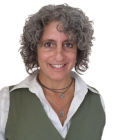Therapy
Why I Kidnapped My Daughter
Sometimes the most radical action is the only way out.
Posted April 8, 2019 Reviewed by Ekua Hagan
Guest writer Simone Silver, MSW is a writer, mother, healer, and social worker/therapist. She has recently been navigating the world of struggling teenagers and their families through personal experience with her daughter. Due to the sensitive nature of this subject, names have been changed to protect the privacy of her family. Hopefully, other families and teens will benefit from her heartfelt, introspective stories, adventures, and revelations. She can be reached at SimoneSilver7@gmail.com.
Note from S. Stein, PsyD: It's important to note that while this is a success story, there are many programs that have had reports of abuse and have very little (to no) oversight. This story is in no way representative of all such programs or teens in them. Please do dilligent research (and use the suggested resources at the end of the article) before considering this--or any--type of intervention.
I hired someone to kidnap my daughter. I suppose that sounds terrible. And at one point, I might have agreed. But now, eight months later, I consider it one of the best (and most difficult) decisions I have made as a parent.
I’m sure you must be wondering why on earth I would kidnap my daughter. And I will get back to that, but first I’ll start with the backstory:
My daughter is now a high school sophomore. I’ll call her Sophie (a pseudonym to protect her privacy). Our relationship was never easy, but in the last few years, it grew progressively harder. Our interactions became volatile, and Sophie was verbally abusive to me nearly every day, wishing death or worse upon me. And I (not my proudest moments) reacted with words that were at times unkind or even abusive. Our whole family was suffering.
A Childhood on the Edge
Let me back up a little. Sophie was a sweet, easy baby and a wide-eyed, compassionate little girl. But around age three, she began to struggle, becoming overwhelmed and emotionally dysregulated during transitions or if she didn’t get her way. Our play therapist suspected that Sophie and I hadn’t bonded at birth, so we did therapeutic work around that, and we supplemented play therapy with occupational therapy, applied kinesiology, and naturopathy to help Sophie be more at ease in her body, her relationships, and the world.
We muscled through and survived elementary school, where Sophie “outgrew” an ADHD diagnosis that we chose not to medicate. But in eighth grade, she was struck with a mysterious fatigue that had her sleeping 20 hours a day for days on end. Neurological testing came up empty. And months later, as mysteriously as it began, the fatigue faded and was gone.
Early Trauma
I’ll be the first to acknowledge that Sophie hasn’t had the easiest life. Her biological father abandoned us while she was in utero, which made for an emotionally turbulent pregnancy and left me facing the harsh reality of parenting her alone from birth. Eventually, I married when she was four. Her stepfather adopted her a year later, and sadly, her first brother was stillborn that same year. Another brother was born when she was seven, and five years later, her dad and I separated and divorced.
I’m not sure how any of this plays into her psychological state, how much of it is our dynamic, and how much may be due to my own imperfect parenting … but we saw a rapid decline in Sophie’s overall function in the last few years. She lost interest in activities, and her anger increased to the point of rage, punctuated with wishes and threats of harm to others and to herself.
We also saw extreme social media/screen addiction, combined with isolation, destructive eating habits, and a total inability (or unwillingness) to take on the responsibilities one would expect from a functioning teenager.
A Suicidal Teen
In the end, the most alarming behavior was the threat of suicide in protest of her new therapist-mentor. “If you make me see her one more time, I’m going to kill myself!” Which, one might argue, sounds like overreactive, drama-filled, teenage behavior that probably isn’t that far out of the ordinary. But as our family therapist pointed out, while it may have been “just” a manipulation, and she may not have actually been planning her suicide, “Who says something like that?”
Someone who is in a lot of pain, that’s who.
Garnering Support
In the spring of Sophie’s freshman year, we hired an educational consultant and began comprehensive family therapy, including the mentoring for Sophie. I attended a weekly support group for families who were struggling with their teens, and her father and I began the process of seriously considering wilderness therapy for our daughter.
This was scary. Especially for me. After I completed my master’s degree in social work in 1994, I considered working for a wilderness therapy program but was frightened by my notion of the teens and the program itself. I had heard stories of “boot camp” and “last stop before prison” … and perhaps it was.
Maybe if these teens, mine included, didn’t get help, they would end up in prison. There or dead. But after listening to the parents in my support group, I learned that these kids are not hardened criminals or hopeless drug addicts or depressives. They are young people who are needing guidance and support, a respite from academic and social pressures, and an opportunity to self-reflect, develop mastery over something, build self-esteem, and grow into their potential.
What to Do?
Now back to the kidnapping. What are parents to do when their teenager has become disruptive, abusive, even dangerous—and refuses to do any personal work or take responsibility for her behavior? Believe me, we tried so many interventions! From individual therapy to family therapy, group work, dialectical behavioral therapy, mentoring, and consulting, she shut it all down: refused to go, walked out, or sat there without participating. We kept holding out for a solution at home, but when comprehensive psychological testing concluded that an hour of therapy once or twice a week while living at home simply wouldn’t be enough to get to the root of our issues, we finally wrapped our heads around wilderness therapy—the most intensive intervention.
Three Months Unplugged
Wilderness therapy is a short-term, 8- to 12-week intervention where teens spend all their time—wait for it—in the wilderness. Shocking I know, but seriously, it’s a highly structured experiential program that combines mastery of wilderness survival skills with group therapy, individual therapy, and family therapy (the latter done through letter writing and conference calls). Unplugged from technology and the influences of friends, and sometimes assisted by yoga and meditation, the teen is able to truly turn inward. Skilled wilderness guides lead the teens on hiking/camping expositions, and time is divided between being “on expo” and at base camp, where they rest their bodies and dig into their therapeutic work.
Parents, meanwhile, are asked to do their personal work. This includes reading books, doing introspective homework, writing therapeutic letters to their teen, and participating in family therapy. And it’s always suggested that parents do individual therapy at this time. It’s hard work for all involved, and parents must be willing to acknowledge their mistakes and take responsibility for their own destructive and dysfunctional behaviors.
Again, I digress. The kidnapping. Right. Because our daughter wouldn’t even entertain a conversation with our educational consultant and threatened suicide in reaction to attending her mentoring session (which was, in fact, indoor rock climbing), we determined that she was unlikely to willingly get into a car or onto a plane with us to go to a wilderness program. Enter the kidnappers … er, transporters.
“Gooned” at Night
The teens call it “getting gooned.” Around three-quarters of teens who attend wilderness therapy programs are professionally transported there. Transporters are trained in the art of safe physical restraint. Our educational consultant recommended two companies (of many), and I called them both. I chose the one that was run by a social worker (I liked that). I spoke directly to him when I called (I really liked that).
We were coached on what to do the night the transporters came to pick Sophie up. Brandon and Susan arrived at 3:00 a.m. They had been vetted and company bonded and insured (and, of course, there had been a number of conversations and a whole pile of paperwork before this). Both were strong in body and sweet in personality.
We had been prepped to wake Sophie and tell her four things:
- We love you.
- We found a program that is going to help our family.
- You are going there now.
- We will be in touch.
And then we were told to leave the house.
Obviously, she was confused, and frankly, that was the hardest night of my life. I wondered if Sophie would ever forgive me. She left the house with only the clothes on her back and a book. They flew her part way and drove the rest (a six-hour drive), which gave our daughter a chance to drop into what was happening before arriving in the Utah desert.
We received reassuring texts all along the journey. I communicated a bit with Sophie indirectly through the transporters, but she was not allowed to use their phones. By the end of the day, she arrived in the Utah desert at the wilderness program, and the rest is history.

A 12-Week Transformation
When I first visited Sophie in the desert, I was terrified. Would she still be angry? As we walked toward each other on a dusty trail, my heart was racing. We embraced, awkwardly, and the first thing she said was, “Mom, I want to climb Mount Everest!” and then, “I want to train to be a wilderness first responder!” Apparently, something was working!
Our daughter completed her wilderness therapy program in 12 weeks after progressing into a leadership role and is now thriving at a yearlong all-girls program in Utah. We have visited numerous times. She is doing well in school and learning to play the piano. Finally digging into the hard stuff from the past, Sophie is feeling her pain, expressing it, and seeking help when she gets stuck. While learning to be assertive in asking for what she needs, she is developing the ability to take “no” for an answer.
Today, Sophie is a pleasure. She is thoughtful and kind, uses her words calmly, respects boundaries, and asks for her boundaries to be respected. It’s amazing … incredible, really. And yes, she misses her friends, but that’s okay because she is growing.
Best of all, she understands why we sent her away. I have no doubt that she will someday appreciate having attended these two programs and being afforded the space and resources to do this hard work now, while she is still young, so she can move into her adulthood lighter, more capable, and full of hope.
And when she traveled from the wilderness to her current program? Sophie willingly got into the car with her dad and then onto the plane.
No goons required.
Resources and Recommendations
- Find a good educational consultant. (You don’t have to do this alone, and it’s overwhelming to try.) Educational consultants have a wealth of information about programs and about specific therapists (the most important element!) at those programs, and they will help find a good match for your teen and your family. Some consultants are therapists themselves and may run support groups for the families they serve. If this is important to you, ask around and keep looking. (I know that hiring a consultant seems like a huge and potentially unnecessary expense, but trust me when I say that you are likely to shoot yourself in the foot if you choose to go it alone—and may end up paying even more without one. If you choose a program based on a website or something that worked for someone else’s child, you may end up with a failed placement and then having to repeat the process.)
- The Independent Educational Consultant's Association is an umbrella organization for educational consultants. From the IECA website: “Our member educational consultants who specialize in helping families with troubled teens have extensive experience working with crisis intervention, dealing with oppositional behaviors, and other emotional/behavioral difficulties, and finding the most suitable solutions.” Use the Search for IECA Member feature to find an educational consultant who specializes in therapeutic placements.
- Do your due diligence. Although your educational consultant will do most of the heavy lifting, you still want to research the programs that are suggested to you and possibly suggest programs to your consultant to check out.
- The Outdoor Behavioral Healthcare Council is an umbrella organization for wilderness and other outdoor programs. From the OBH website: “The Outdoor Behavioral Healthcare Council was founded in 1996 when representatives from a handful of wilderness treatment programs joined to collaborate and to share best practices. The founding programs realized the advantage of uniting to promote program standards and excellence and thus the OBH Council was founded. Today, the organization and its member programs have been instrumental in raising the bar for wilderness treatment, facilitating research on the efficacy of wilderness treatment for adolescents, and in promoting the industry.” AEE OBH Accreditation is a voluntary credentialing program for outdoor behavioral healthcare providers.
- Consult the National Association of Therapeutic Schools and Programs. From the NATSAP website: “The National Association of Therapeutic Schools and Programs serves as an advocate and resource for innovative organizations which devote themselves to society’s need for the effective care and education of struggling young people and their families.” Here is a link to its 2017–2018 directory.
- Seek out financial assistance. There are nonprofits that offer grants and matching grants to help pay for your wilderness program. One example is Sky’s the Limit Fund, a nonprofit organization that selectively awards scholarships to wilderness therapy students. From the STLF website: "Sky’s the Limit Fund (STLF) supports families of youth in crisis by providing grants to reduce tuition for Wilderness Therapy. By providing these grants, STLF is breaking the barriers that have previously denied financially struggling families the means to transform their child’s life through this effective form of treatment.”
- Borrow money if you need to. Prosper Healthcare Lending is one lender that specializes in loans for healthcare expenses. (This is not an endorsement. I have no affiliation or personal experience with this company and do not benefit financially from listing it here). Don’t be shy to reach out to family and friends for a loan or contribution. This is important!
- Hold your public school district financially accountable. If your school district has been unable to provide education and support for your teen, it is required by law to pay for an alternative. Hire a lawyer if you need assistance. There are lawyers who specialize in these types of cases and networks of parents who can help you navigate the system. Ask for help.
- Take care of yourself. Once you are out of crisis mode, prioritize your self-care. Sleep. Drink water. Get into nature. Meditate. Take walks. Exercise. Spend time with friends. Connect with allies. Do whatever you do to soothe your spirit, nourish your body, and calm your mind.
- Breathe. You can do this.




